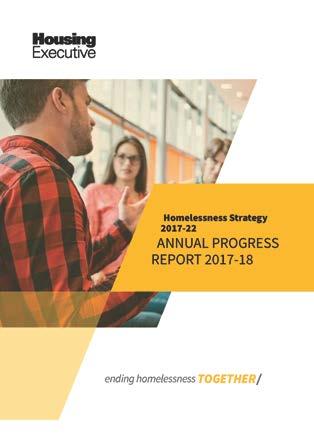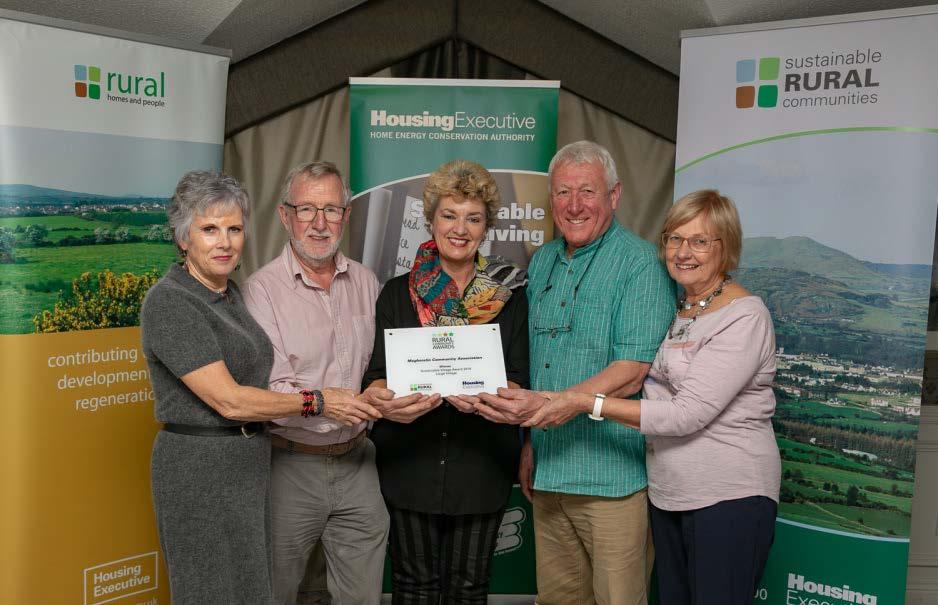
14 minute read
Strategic Context
Strategic Context
The Housing Executive developed the Housing Investment Plan 2019-23 within the context of the Northern Ireland policy framework.
Welfare Reform
Welfare Reform has meant significant changes to the benefit system for people of working age in Northern Ireland. Whilst all of the changes have had some effect on the Housing Executive, those which have had most impact are Social Sector Size Criteria (Bedroom Tax), Universal Credit and Benefit Cap. In March 2019 Social Sector Size Criteria, for example, was directly impacting on 24,587 Housing Executive tenants; meanwhile 230 were affected by Benefit Cap.
However, there are measures in place for people in Northern Ireland to reduce the impact of many of the welfare changes, including Social Sector Size Criteria and Benefit Cap. These Welfare Supplementary Payments (mitigation) are available until March 2020 and are administered by the Department for Communities (DfC).
Universal Credit, which is being implemented by DfC, replaces a number of working age benefits, including Housing Benefit. It was introduced in Northern Ireland on a geographical basis between September 2017 and December 2018 for new working age claimants of those benefits being replaced. Roll-out has also meant that existing working age claimants of these benefits, who have a significant change in their circumstances, naturally migrate to Universal Credit. By March 2019, the Housing Executive had 5,944 tenants claiming Universal Credit. Natural migration to Universal Credit continues and will do so until Universal Credit is fully implemented through ‘managed migration’ where working-age customers on the relevant benefits will be moved to Universal Credit. This is due to start January 2020 and finish by December 2023 and it is anticipated that some 45,000 Housing Executive working age tenants will be affected by Universal Credit when roll-out is complete.
Housing Benefit’s caseload is gradually decreasing and this reduction is likely to continue as Universal Credit’s managed migration phase takes effect. However, Housing Benefit will still have a significant number of customers, approximately 44,000, of State Pension Credit age as well as customers living in supported accommodation or who are placed in temporary accommodation.

The Housing Executive will continue to administer Housing Benefit for DfC along with Discretionary Housing Payments for both Housing Benefit and Universal Credit claimants. These payments are designed to help those who get Housing Benefit or Universal Credit but still experience difficulties meeting their housing costs. In addition, the Housing Executive will continue to administer and manage the recovery of Housing Benefit overpayments including from those claimants with Housing Benefit overpayments who move onto Universal Credit. On behalf of the Department of Finance, Housing Benefit will continue to manage the Low Income Rates Relief for non-working age tenants and Lone Pensioner Allowance schemes.
Homeless Strategy
The First Annual Report on the Housing Executive’s Homelessness Strategy 2017/22 – Ending Homelessness Together was published in October 2018. You can view the report here. The second annual progress report will be published in September 2019.
The report demonstrates the multi-agency approach adopted by the Strategy to both prevent homelessness and to ensure that all clients are provided with the right support to sustain a long term tenancy when one becomes available.
This multi-agency approach is further demonstrated via the established Homelessness Local Area Groups. They bring together a range of agencies from the Statutory, Voluntary and Community Sectors to deliver Action Plans linked to the Strategy to deliver better solutions on the ground for homeless clients.
Homeless Communication Action Plan
The Housing Executive is working on the implementation of a Communication Action Plan to ensure households approaching crisis can access the right support quickly. A Homelessness Awareness E Learning Package has been developed and delivered to all Housing Executive staff. The next stage will be to roll out the package across Statutory, Voluntary and Community Sectors. Relevant information will be provided at key locations e.g. doctor’s surgeries, churches etc. Homelessness Local Area Groups will continue to work to raise awareness of homelessness by arranging information events across NI.
Delivery Strategy and Action Plan
The Housing Executive manages the Social Housing Development Programme (SHDP) on behalf of the DfC. The SHDP is managed on a three-year rolling basis and the current programme period is 2019/20 – 2021/22. All new social housing provided through the SHDP is delivered by housing associations. The Housing Executive works closely with housing associations to ensure delivery of DfC’s annual targets for new social housing starts and completions. The Housing Executive manages the annual SHDP budget and this investment (in the form of Housing Association Grant) is supported by private finance levered in by housing associations.
New social homes delivered through the SHDP are designed to meet a range of applicants’ needs for social housing, including those with general housing requirements, Wheelchair Standard Housing, housing for


active older people and housing for applicants with Complex Needs. The Housing Executive is working with housing associations to increase the provision of new build Wheelchair Standard homes in line with ambitious delivery targets agreed with DfC. A proportion of the SHDP budget is also set aside to fund adaptations to existing housing association properties for people with disabilities. The Housing Executive also monitors the delivery of new social homes in rural areas and engages with housing associations and rural communities to support the sustainability of rural settlements.
Each year, delivery of the SHDP is supported by the transfer of land in Housing Executive ownership to housing associations to facilitate new developments. The Housing Executive also works closely with Land & Property Services to bring forward other public sector property for social housing development through the ‘disposal of surplus public sector property’ process.
The Housing Executive continues to support the Northern Ireland Executive’s Together Building a United Community (TBUC) Programme through the facilitation of new build Shared Housing schemes. Having initially supported the delivery of 10 Shared Housing schemes under the TBUC programme, the Housing Executive is now working with DfC to bring forward up to 200 new Shared Housing units annually through the SHDP under the Housing for All programme.
Asset Management Strategy
The Housing Executive continues to implement the revised strategic investment strategy for its stock that was approved by DfC in October 2017. As such, our investment programme is focused on compliance and Health & Safety activities, adaptations, External Cyclical Maintenance and a programme of major component upgrading (e.g. bathrooms, kitchens, wiring, doors, windows, heating etc.) in order to address both our maintenance backlogs and tenant priorities; delivery of much of this investment continues to be dependent on successful procurements. Given our continued projected long term shortfall in funding, the main imperative remains the development of a sustainable funding solution to meet our future stock investment needs. The three year period for our revised approach agreed by the Department ends in 2020 and, therefore, in the coming year we will be developing a range of strategic options for consideration in the event that our future funding position is not improved.
Tower Blocks
A draft Action Plan for our Tower Blocks was approved by the NIHE Board in May 2018 as the basis for consultation with stakeholders on our proposals. A consultation exercise was undertaken between June and December 2018, and the findings of this exercise informed the preparation of the final Action Plan which was presented to, and approved by, the Board in March 2019. The Action Plan has now been submitted to DfC for its consideration.
Cavity Wall Insulation
In August 2017, the Housing Executive commissioned a research report on cavity wall insulation in both its own stock and private sector housing. The research was undertaken by the British Board of Agrément (BBA) using their Consultancy Investigation and Training (CIT) subsidiary body. Its report was published in May 2019 and indicated a significant issue with cavity wall installations that are not compliant with current standards. The report’s findings are currently being considered by the Housing Executive with the intention of bringing forward an action plan in autumn 2019.
Research Programme
As the strategic housing authority in Northern Ireland, the Housing Executive has a statutory responsibility to regularly examine housing conditions and need, and may also conduct or promote research into any matter relating to any of its functions. Some of the key projects provide data on an ongoing or regular basis including: the Northern Ireland House Condition Survey; Continuous Tenant Omnibus Survey; and a number of strands of research on house prices, rents and affordability, which is carried out in partnership with Ulster University and propertynews.com. During the past year, reports have also been published on: the cost of poor housing in Northern Ireland; the cost to bring dwellings in the region to an agreed level of energy efficiency; the views of residents living in homes constructed by housing associations as part of the Social Housing Development Programme during the financial year 2015/16; and the Broad Rental Market Areas and Local Housing Allowance (LHA) rates used to calculate private sector Housing Benefit.
Work currently under way or due to commence soon includes: research to help inform the Homelessness Strategy; an Irish Traveller Housing Needs Assessment; a survey to provide an overview of the longer term outcomes of the House Sales Scheme; research to gather the views of private rented sector landlords on a range of issues; and further projects to help the Housing Executive assess and plan for the impacts of welfare reform.
Customer Excellence Strategy
A Customer Excellence Strategy 2017 – 2020 was approved by the Housing Executive Board in November 2017. The strategy aims to: provide choices for how customers will interact or do business with us; to increase their control over their experience with us; to improve our digital services and outline a clear direction for how we will improve the way we deliver services to our customers. The strategy recognises that customers are interacting with us in different ways and their expectations of us to respond and address their needs have changed in recent years.
To accompany the strategy there are annual action plans for each year covered by the strategy. These yearly action plans detail activities to be completed within year, under five key themes. The first annual update was published on our website in December 2018 and can be accessed here at the following link Customer Excellence Strategy.


Community Involvement Strategy
In 2018, the Housing Executive published the Community Involvement Strategy 2018-23. The previous strategy was directed towards tenants; however, the new strategy takes into account the change in population in Northern Ireland and in our communities. It is aimed at working with tenants, residents and leaseholders to ensure everyone’s voice is heard. The new strategy provides flexibility to work with the
community in a way that suits them and reflects our commitment to work with others to get the best outcomes for local communities.
Supporting People Strategy and Action Plan
The Housing Executive acts as the administering authority for the Supporting People (SP) Programme in Northern Ireland. This role includes the payment of SP Grant to approximately 90 providers of housing support services, which deliver assistance with housing related tasks to more than 19,000 vulnerable people in order to help them develop or maintain the skills necessary to live as independently as possible in their own home. In 2019/20, the budget is £72.8m. The Housing Executive has ongoing plans to monitor and review SP services through the contract management framework, and take actions to remodel/realign services as needed. For further information on the SP programme see the strategy here Supporting People Strategy.
Rural Strategy & Action Plan
The Housing Executive has long recognised that in rural areas, housing needs can be hidden or dispersed and that a different approach is often required to ensure that we deliver our statutory housing functions in both urban and rural areas. The introduction of the Rural Needs Act (NI) 2016, has presented an opportunity for us to reaffirm our commitment to rural communities by ensuring that we pay due regard to their needs through the delivery of a fair and equitable housing service which takes account of local issues and circumstances.
For many rural households, housing choices can be more limited due to unsuitable stock, unaffordable prices and a lack of rental accommodation. Our Rural Strategy and Action Plan 2016-20 identifies in particular, the need to increase the provision of affordable housing in rural areas in order to help protect and sustain rural communities. Through the Housing Executive’s annual programme of rural housing need tests, we engage with communities who wish to examine the need for new housing in their area and with housing associations to encourage the delivery of new rural housing where it is required.
The Housing Executive’s contribution to rural regeneration extends beyond the provision and maintenance of housing to the capital funding invested for the development and improvement of local community facilities and services. In 2019/20, the Housing Executive will also continue to celebrate the invaluable contribution of the rural community groups through the annual Rural Community Awards competition.
Irish Travellers
The Housing Executive commissioned and published Comprehensive Traveller Accommodation Needs Assessments in 2002, 2008 and 2015 to establish the accommodation needs (for social housing, Traveller specific Group Housing, serviced sites and transit sites) of the Irish Traveller Community across Northern


Ireland. In 2019, new research will be undertaken to provide the necessary information to enable a new Irish Traveller Strategy and Needs Assessment to be developed for the period 2020-25.
Sustainable Communities
Handiheat is a €2m energy efficiency project, led by the Housing Executive, launched October 2018. In October 2018, the Northern Periphery & Arctic Programme, supported by European Regional Development Funding, awarded a project to a Northern European energy partnership. This three year project will be led by Housing Executive and researched in partnership with energy teams from Northern Ireland, Ireland, Scotland, Finland and Iceland.
This project’s goal is to establish how domestic heating solutions can utilise energy efficiency and renewable energy for rural communities across the project area. With continued high levels of oil dependency and the strategic context of the Clean Growth Strategy, there is an imperative to find alternatives to this fossil fuel.
Aligned with this project, the Housing Executive will lead on a second demonstration pilot, observing energy use in a small number of our Fermanagh homes. This model will evaluate a combination of hybrid and low carbon heating solutions, with value for money energy efficiency measures. A hybrid boiler, heat pumps, solar photovoltaic (PV) and energy storage systems, with value for money insulation measures, will be installed to each of the chosen properties.
Accessible Housing Register (AHR)
The Housing Executive is working with Northern Ireland Federation of Housing Associations (NIFHA) to identify social housing properties that are accessible to those with mobility issues. When this work is complete, the Housing Executive will have an Accessible Housing Register for social housing. The Housing Executive intends to develop a system to identify private rented accessible properties on the new NIHE website.
DfC undertook a fundamental review of the PRS in 2016. Following a public consultation in 2017, 52 responses were received. DfC has prepared a government response for Ministerial approval. When a Minister is appointed, the Department will publish details on the way forward.
Fundamental Review of Social Housing Allocations
DfC are finalising a report on the consultation exercise, which was carried out at the end of 2017, on proposals for changes to social housing allocations in Northern Ireland. The Housing Executive will continue to contribute to the Fundamental Review of Social Housing Allocations and is working closely with DfC on the proposals for change to determine next steps.
Affordable Housing
Affordable housing is funded through interest-free loans from government. Co-ownership, which provides the majority of shared ownership homes in Northern Ireland, receives government support through Financial Transactions Capital (FTC) with £100m secured until 2020.
The Affordable Homes Loan Fund has piloted FairShare, which has been set up by Apex, Clanmil and Choice as a new shared ownership scheme enabling homebuyers who cannot afford to purchase a property outright, to buy a share of a property directly from a housing association and pay rent on the rest. Co-Ownership continues to operate the Rent to Own initiative with the £12.5m FTC funding received. To date 33 properties have been funded across NI.
DfC has published the ‘Definition of Affordable Housing’ Consultation Paper with consultation ending on 13 September 2019. The overall aim of this work is to agree a clear definition of affordable housing that can be applied consistently in legislation, policy, local plans and in practice.
Community Asset Transfer
The Housing Executive will transfer land/property under the Community Asset Transfer framework to deliver community regeneration. Policy is currently being developed by DfC to implement this framework.



